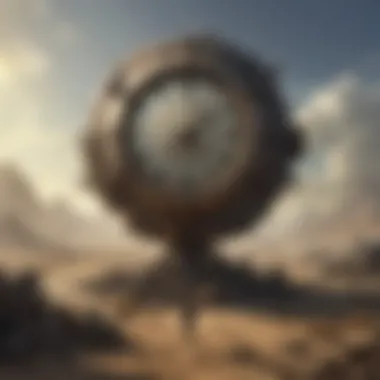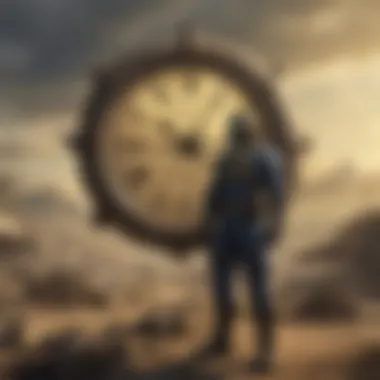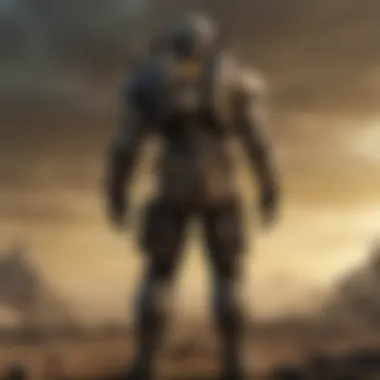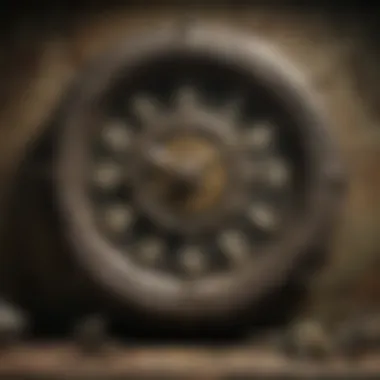The Fallout Clock: Its Significance in the Apocalypse


Intro
In the sprawling universe of Fallout, time is more than just a ticking clock; it’s a thread woven through the fabric of a post-apocalyptic world. The Fallout Clock, as both a symbol and a functional element, serves various purposes that resonate deeply within the narrative and gameplay of the series. This article aims to unravel its significance – how it enhances storytelling, affects player actions, and mirrors critical themes like survival and the human experience.
Understanding the Fallout Clock means delving into not just its historical context within the Fallout universe but also its mechanics, which inform the choices and consequences faced by players. This perspective is vital for anyone looking to deepen their appreciation for the series, whether you are a seasoned player or a newcomer eager to explore the wasteland.
Lore Insights
Overview of the Fallout Universe
Founded on alternate historical timelines and steeped in retro-futurism, the Fallout universe presents a world ravaged by nuclear devastation, where humanity grapples with the shadows of its past. The Fallout Clock acts as a silent witness to the unfolding drama, reminding us of time's relentless nature in a world that has come to a standstill. Its intricate relationship with the game's lore highlights critical themes such as decay, endurance, and the cyclical nature of history.
Key Historical Events in the Fallout Timeline
The timeline of the Fallout series is littered with significant events that reflect the decay of civilization and the impact of nuclear war.
- The Great War (2077): A cataclysmic event that reshaped the world, the Great War reduced cities to rubble and led to the emergence of the wastelands. It also marked the birth of the Vaults, designed to preserve humanity amidst impending doom.
- Rise of the Brotherhood of Steel: In the aftermath, factions like the Brotherhood of Steel emerged, demonstrating how humanity seeks order amidst chaos.
- The emergence of Super Mutants: Genetic alterations and mutations due to radiation gave rise to new threats, symbolizing the unforeseen consequences of human action.
These historical touchpoints intertwine with the Fallout Clock, embodying the irreversible changes to society and the passage of time.
Deep Dive into the Backstory of Major Factions and Characters
Factions and characters populate the Fallout landscape, each bringing forth unique stories and motivations framed around survival. The Institute, a shadowy organization represented by its advanced technology, stands at odds with the more brute-force approach of the Raiders and the noble aspirations of the Minutemen.
It's here that the Fallout Clock holds a deeper significance: it reminds players that each faction's decisions are bound by the constraints of time. For instance, the Institute's quest to advance humanity through technology contrasts starkly with the Minutemen's grassroots efforts to rebuild communities—each influenced by their understanding of time and survival.
"In a world where the past looms larger than the future, every tick of the Fallout Clock reverberates through the wasteland, echoing the choices of factions and individuals alike."
End
As we piece together the intricate narrative of the Fallout universe, it's clear that the Fallout Clock is more than a mere object. It encapsulates the essence of time in a world where every second counts for survival. Examining its role aids in uncovering the complex relationships between the game’s setting, storyline, and its characters, enriching the player’s experience immeasurably.
The Significance of the Fallout Clock
The Fallout Clock occupies a unique position in the landscape of the post-apocalyptic narrative. It is not merely a mechanism of tracking time; rather, it serves as a profound symbol of the interconnected themes of survival, loss, and hope that resonate through the various iterations of the game series. In the chaotic aftermath of nuclear catastrophe, where minutes can mean life or death, the clock emerges as an emblem of temporal significance. Players navigate a world frozen in a moment of calamity, and this clock marks both the dissolution of the old world and the fragile possibility of renewal.
Through its symbolism, the Fallout Clock becomes a vital instrument for storytelling. It reminds players that while they may have survived the initial fallout, the ticking clock continues to signify the relentless march of time and the finite nature of existence. How one utilizes their time within the game influences the narrative outcomes, pushing players to strategize carefully. Therefore, understanding the significance of this clock encompasses both practical gameplay elements and deeper philosophical considerations about mortality and the human condition.
A Temporal Mark in the Wasteland
In the grim expanse of the wasteland, the Fallout Clock stands as a temporal marker. It creates a framework within which players engage with their environment. Everything from resource gathering to combat encounters is underscored by the necessity to be vigilant of time. Unlike a traditional RPG where time may flow at the player’s leisure, the Fallout Clock introduces a sense of urgency. Missions often come with deadlines, forcing players to prioritize their objectives.
For example, a player might encounter a time-sensitive quest involving the rescue of a fellow survivor or the completion of a critical task before a looming threat emerges. Such encounters ignite tension and demand swift decision-making, enhancing the immersive experience. This temporal pressure not only elevates gameplay dynamics but also mirrors the desperation of surviving in a desolate land governed by uncertainty.
A Symbol of Endings and New Beginnings
The cyclical nature of the Fallout Clock also brings forth the idea of endings and new beginnings. Players are constantly reminded that every ending, be it the closure of a quest, the fall of a character, or the end of a faction, opens the door for new possibilities. This continuum feeds into the overarching narrative of rebuilding after destruction.
The wasteland is littered with remnants of the past—abandoned homes, rusted vehicles, and forgotten cities all tell stories of what once was. Understanding this juxtaposition allows players to forge paths into the future, whether that means aligning with certain factions, forging alliances, or completely changing the status quo.
"Time is a relentless cycle, reminding us that even in decay, hope can sprout anew."
Historical Context of the Fallout Clock
The Fallout Clock holds a profound place within the lore and culture surrounding the Fallout game series. This section dives deeper into its historical significance. Fallout, emerged in the wake of heightened tensions during the late 20th century, a time when fear of nuclear war loomed large over society. The Fallout Clock encapsulates that anxiety, serving as a reminder of what could come from that dread, and plays a pivotal role in weaving the narratives of the games.
As players navigate a world ravaged by atomic devastation, the clock stands not merely as a feature but as a symbol of humanity’s struggle against its self-made catastrophes. By bringing to light the historical factors that shaped the inclusion of this element, we can further appreciate its intricate role within the series.
Nuclear Anxiety and Popular Culture
During the mid-20th century, particularly during the Cold War, nuclear anxiety hit its peak. This era left an indelible mark not just on politics, but also on popular culture. Movies, literature, and art began to reflect society’s fears regarding nuclear fallout. Icons from the time like Dr. Strangelove and The Day After mirrored the societal panic over impending apocalypse. The Fallout Clock, in its essence, is a capsule of this existential dread. Here’s how:
- Cinematic References: Films often depicted scenes of nuclear disaster with countdowns in play, making the viewer acutely aware of time running out, much like the Fallout Clock does in gameplay.
- Literature: Books like On the Beach expressed the somber reality of a post-apocalyptic world, echoing themes of inevitable doom, similar to narratives woven within the Fallout series.
- Art Movements: Artists expressed their anxieties about nuclear fallout through surrealism, capturing the haunting uncertainty of a future ravaged by war.


By intertwining these cultural elements, the Fallout Clock serves as more than just a mechanical aspect within gameplay. It echoes the fears and sentiments of generations, allowing players to grapple with complex themes related to time, existence, and morality.
Real-life Inspirations and References
The concept of the Fallout Clock draws directly from the real-world events surrounding nuclear arms development and fears of total annihilation. Notably, the doomsday clock created by the Bulletin of the Atomic Scientists serves as a metaphor for our proximity to apocalypse.
"The closer the clock is to midnight, the closer we are to destruction, suggesting that time is indeed, an enemy."
This inspired the developers of Fallout, reflecting a society that constantly lives on edge, waiting for the next disaster. Here are some inspirations:
- The Manhattan Project: This secret project that led to the creation of the first atomic bombs is pivotal in understanding why the clock symbolizes the culmination of mankind's destructive capabilities.
- Global Nuclear Treaties: Events like the signing of the Nuclear Non-Proliferation Treaty display humanity's desire to stomp out the darkness of nuclear fear, further contextualizing the urgency within the games.
- The Cuban Missile Crisis: A direct brush with real nuclear conflict escalated fears and became a reference point for many creators in highlighting the fragility of peace.
In sum, the Fallout Clock isn’t merely an in-game mechanic. It is a reflection of our historical realities, weaving in the cultural consequences of our choices and reminding us of the delicate balance of existence against the ticking clock. As players engage with this thematic element, they’re not just playing a game; they're reckoning with the echoes of our past.
Gameplay Mechanics Involving the Fallout Clock
The Fallout Clock serves as a pivotal element that intertwines gameplay mechanics with narrative depth in the Fallout series. Its unique approach to time management not only influences player strategies but also enhances the immersive experience of surviving in a post-apocalyptic world. As players traverse the desolate landscapes, the ticking of the clock is more than just a background noise; it acts as a constant reminder of the urgency brought forth by their circumstances. Through this lens, we can dissect how time-based mechanics manifest in both missions and survival strategies.
Time-Based Missions and Events
In the Fallout universe, the structure of time-based missions is artfully woven into the fabric of gameplay. Players frequently encounter quests that revolve around strict deadlines or rapidly changing scenarios, pushing them to act swiftly. For example, in Fallout 3, the mission "A Capital Waste" requires the player to dismantle a bomb within a hastily approaching window; if they falter, the consequences are dire. This technical layer emphasizes planning and adaptability.
Such missions tap into a deeper emotional resonance. As the clock ticks, players can feel a kind of palpable tension. It's not just about completing a task but grappling with potential loss and subsequent decisions that might echo throughout their journey. These mechanics engage the players in a dance against time—a reminder that every moment spent deliberating could mean life or death in a hostile environment.
Additionally, events like random encounters often break the narrative's flow, forcing players to react within a limited timeframe. The spontaneous nature of such occurrences fosters a learning curve, where each glitch in timing contributes to the player's growth, reflecting the quick wits needed to navigate an unstable world.
Survival Elements and Time Management
Survival in Fallout is more than just combatting foes; it involves meticulous time management intertwined with resource allocation and strategic planning. Every minute spent scavenging or crafting can mean the difference between life and death. Players must balance immediately pressing needs—such as gathering water or food—with more strategic long-term goals, leading to a complex interplay of survival tactics.
The Fallout Clock plays a role here too, especially in how players manage their in-game time.
- Resource Gathering: Players often weigh the benefits of searching a building for loot against the risk of encountering enemies or radioactive zones.
- Crafting: Items take varying amounts of time to create; prioritization becomes essential when resources are limited.
- Rest and Recuperation: Players need to find safe havens to recover health, and each decision adds to the ongoing tension of the clock.
"Game Design isn’t just about choices but managing the consequences of those choices. The Fallout Clock embodies that principle by demanding players to think critically under pressure."
In essence, the mechanics surrounding the Fallout Clock deepen the player’s engagement with the game. They create a rhythm to the experience that, while artificially constructed, feels profoundly organic. Whether it's racing against survival instincts or planning methodically for impending missions, the clock's influence is an ever-present reminder that in the world of Fallout, time is both an ally and an enemy.
Narrative Influence of the Fallout Clock
The Fallout Clock is not just a mechanism for tracking time; it weaves a rich tapestry of narrative context within the post-apocalyptic landscape of the Fallout series. Its significance is multifaceted, serving as both a grim reminder of humanity’s past and an agent for shaping plot developments. By studying the Fallout Clock, players observe how time related events and its implications enhance thematic depth and character progression. This section underscores the essential role the Fallout Clock plays in crafting jarring scenarios and critical moments that resonate with players long after they put down the controller.
Creating a Sense of Urgency
In a world rife with desolation and chaos, the Fallout Clock serves as a relentless, ticking reminder that time is often against the player. This concept of urgency permeates through various game missions and quests, pushing players to act swiftly, lest they miss out on opportunities or face dire consequences. Each glance at the in-game clock can evoke a feeling that seconds translate into life or death, drawing players deeper into the narrative.
A standout example is the time-sensitive quests, where players must complete objectives before a catastrophic event unfolds. Often, characters encourage haste, stating something like "Each tick, another moment we risk losing everything." This urgency instills an emotional response, amplifying the tension as players rush to make choices that dictate their fate—and that of others in the wasteland.
"In the realm of Fallout, time isn’t just a measure; it’s a weapon."
Time Travel and Its Narrative Implications
Time travel stands out as one of the most intriguing narrative devices in the Fallout series. Within specific installments, such as Fallout 3, players encounter storylines that engage with the concept of time travel through various mediums, creating a unique narrative interplay. The intricate plots tied to manipulating time invite players to explore alternative timelines and consequences of their actions, blurring the lines of destiny and choice.
Not only does it allow players to revisit pivotal moments, but it also raises profound questions about morality, loss, and the prospect of redemption. Characters reflect on their choices, pondering whether they could alter their past to create a better future. The Fallout Clock, in this regard, becomes a philosophical anchor for explorations into causality, emphasizing that every action reverberates through time.
In essence, the inclusion of time travel themes enriches the narrative by challenging players to consider the broader implications of their decisions, further solidifying the Fallout Clock’s role as a cornerstone of the series’ storytelling framework.
The Fallout Clock in Different Installments
As the Fallout series unfurls, each installment reinterprets the notion of time, reflected poignantly through the Fallout Clock. Its presence reverberates through gameplay, narrative, and player decision-making processes, painting a complex tableau of survival in a world long ravaged. Understanding how this ticking embodiment of temporality evolves across the Fallout titles grants keen insight into its thematic significance and role in player immersion.
Fallout, Fallout , and Fallout


In the early games, Fallout and Fallout 2, the Fallout Clock serves not merely as a reminder of the past but as a stark indicator of the present's fragility. Players navigate a world where remnants of civilization linger, yet time feels infinitely suspended amidst the ruins. The ticking clock often symbolizes the lingering consequences of nuclear war, urging players to confront the ghosts of their choices.
- Temporal Choices: In Fallout 1, time influences quest progression. Completing tasks hastily or dawdling can lead to dire outcomes for settlements. The player isn't just a passive observer; they wield time like a tool or a weapon, shaping the landscape further ravaged by time itself.
- Narrative Urgency: In Fallout 2, the clock amplifies the stakes involving the player's quest to save the Vault. The looming uncertainty of a world dictated by an absence of order makes each decision feel crucial; thus, the clock resonates as a heartbeat driving characters forward.
- Environmental Storytelling: With the introduction of Fallout 3, the concept deepens further. The clock embodies the impending threat of instability amidst the Capital Wasteland. Players encounter environments that are almost frozen in time, where past inhabitants left ungraspable fragments of their lives, such as a child's toy or a rusted clock itself—each telling a fragment of time gone by.
Fallout: New Vegas and Fallout
The New Vegas and Fallout 4 installments reframe time management against a backdrop of player agency and broader conflicts. Here, the Fallout Clock hints at possibilities, not just limitations.
- Factional Timelines: In Fallout: New Vegas, the clock reflects the nuanced relationships between factions vying for control. Time is interwoven with diplomacy; the player must gauge the best moment to align themselves. Missions involve timing that captures the interplay between the past and future of the Mojave. Will you act swiftly to aid one faction, or will you capitalize on the chaos to forge paths for others?
- Mechanics of Conflict: Meanwhile, Fallout 4 introduces the clock in relation to Synths and the Institute. Temporal dynamics present moral quandaries that weigh heavily on the player. Does one make haste and join the battle for humanity's future, or wallow in indecision, letting time slip away? The very act of rebuilding or dismantling structures in this reality leans heavily on time's relentless march.
"In the end, the clock is not just about the minutes ticking by; it’s a meditation on every moment that could have been, in a world where survival often hinges on finding the right moment to act or reflect."
The Fallout Clock transforms into a metaphor for choices that linger just as the fallout itself, encapsulating the essence of what it means to navigate a harsh and unpredictable landscape. Through the lens of each title, players grasp the profundity of time; it refuses to be ignored, relentlessly pushing forth the narrative and gameplay that lies in the heart of the Fallout universe.
The Fallout Clock as a Metaphor
The Fallout Clock serves as more than just a gameplay element within the Fallout series; it encapsulates fundamental themes of human existence, reflecting our ongoing struggle against time and mortality. In a post-apocalyptic world, where survival often hinges on quick thinking and even quicker actions, the clock becomes a profound symbol of both despair and hope. As players navigate the ruins of civilization, the clock acts not merely as a reminder of the past but as a prompt for deep introspection about life, death, and what it means to live in a collapsing world. This section will dissect how this metaphorical significance resonates with players and reflects real-world concerns.
Confronting Mortality and Existence
In a landscape dotted with remnants of what once was, the Fallout Clock forces players to confront their own mortality. Each tick echoes the fragility of life in a wasteland filled with threats, from mutated creatures to irradiated landscapes. This persistent sense of danger nudges players to evaluate their choices, pushing them to either embrace a reckless survivalist attitude or adopt a more cautious, strategic mindset. The clock symbolizes the ever-dwindling time one has to accomplish their goals, whether it's completing quests, forming alliances, or simply surviving another day in the harsh environment.
Furthermore, the landscape of Fallout encourages an exploration of existential themes. The juxtaposition of a ticking clock against the backdrop of a ruined civilization highlights a profound truth: even in a world laid to waste, life must continue in some form. Players often find themselves reflecting on their place in this seemingly chaotic world. Are they merely surviving, or are they seeking meaning in their actions? In this way, the Fallout Clock does more than tell time; it prods at the existential dread that many experience, all while prompting players to engage in a quest for purpose amid ruins.
Time and the Human Condition
Time, as portrayed through the Fallout Clock, serves as an essential lens through which players can examine the complexities of the human condition. In the game, the relentless march of time underscores various aspects of existence—impermanence, the weight of past choices, and the potential for future actions. Each in-game hour spent scavenging through the remnants of society raises questions about what truly matters in the grand scheme of life.
The narrative encourages players to consider how they allocate their time: Do they invest it in alliances, building shelters, or pursuing fleeting pleasures such as exploring? The choices made reflect broader human tendencies, such as the struggle to balance survival instincts with the desire for connection and meaning.
Moreover, the cyclic nature of the clock resonates with the common human experience of feeling like time is both an ally and an adversary. As the clock ticks, it implicitly represents hope and loss alike. These dualities within the game symbolize the fundamental aspects of life, inviting players to not only survive but also to reflect on their relationships and values, even when existence teeters on the brink of annihilation.
"In the ticking of the clock, we find both solace and despair, a poignant reminder of life’s fleeting nature in a world that forgets so easily."
This exploration of time reveals how the Fallout Clock transcends its functional role, becoming a powerful metaphor that enriches the player's journey and promotes introspection about the essence of life in the face of seemingly insurmountable challenges.
Cultural Impact of the Fallout Clock
The Fallout Clock embodies more than just an in-game mechanic; it transcends to become a cultural icon within the gaming community and beyond. Its symbolism of time running out gives players a palpable sense of urgency and reflects the precariousness of survival in a post-apocalyptic setting. Understanding this cultural impact requires delving into how it influences fan engagement, creative expression, and even the commercial landscape surrounding the series.
Influence on Fan Art and Literature
Fandom thrives on creativity and expression, and the Fallout Clock has sparked a rich tapestry of fan art and literature. Artists and writers draw inspiration from the clock's symbolism, capturing its themes of time, survival, and decay in various formats. For example, artists often depict it in poignant illustrations showing remnants of the pre-war world alongside the clock, symbolizing lost time and the fragility of human endeavors.
"Time is a fickle mistress, much like the wasteland we traverse," a common sentiment echoes in the Fallout community. It reflects in the artwork that portrays characters surrounded by rubble and clock imagery, signifying their constant race against time.
Moreover, fan fiction frequently explores narratives around the clock's implications. Writers weave tales that incorporate the clock as a central motif, examining how time influences personal journeys in a chaotic world. This connection enriches the lore, making it more relevant to the community, often inviting discussions around philosophy, morality, and what it means to survive in a world turned upside down.
Merchandising and Collectibles
The commercial aspects surrounding the Fallout Clock cannot be overlooked. Its representation has extended into the realm of collectibles and merchandise, offering fans tangible pieces of the universe. Limited-edition items, such as clock-themed artwork, replica props, and even apparel featuring the clock's design, have carved a niche in the memorabilia market.
These products not only serve as fan expression but also capitalize on the emotional connection that players hold with the game. For instance, a meticulously crafted replica of the Fallout Clock can evoke nostalgia, serving as a reminder of the narratives and experiences shared within the game world.
In addition to traditional merchandise, the Fallout Clock has found its way into unique platforms like Etsy and conventions, where independent artists showcase their interpretations. This grassroots involvement highlights how the clock has become a versatile symbol that can be interpreted in myriad ways while still resonating with its core themes.
Community Engagement with the Fallout Clock
The Fallout Clock represents more than just an in-game timepiece; it symbolizes a connection that players forge with the game’s universe. Engaging with this concept allows fans to explore shared themes of survival, nostalgia, and even existential reflection. As community members gather around this idea, they contribute to an ongoing narrative that elevates their gaming experience beyond mere gameplay.
Notably, community engagement can foster a sense of belonging. Players often find solace in forums and discussions where they can share insights, frustrations, and triumphs related to the Fallout series. This sense of community is particularly potent because the Fallout Clock serves as a common reference point. It’s a reminder of the relentless march of time in a world filled with decay and uncertainty. Collective discussions often lead to deeper analyses of the motivations behind characters' actions within the universe, helping fans understand how time impacts their journeys and decisions.
Forums and Online Discussions


Online forums have become vibrant platforms for Fallout enthusiasts to delve into the nuances of the Fallout Clock. Websites like Reddit often host discussions where players dissect the lore surrounding the clock and its practical implications in gameplay. Through threads, users can offer their unique interpretations of time events and manicures, encouraging dialogue that reveals the multifaceted nature of this concept.
For instance, threads might explore questions like:
- How does the Fallout Clock represent the passage of time in player narratives?
- Are there any indicators in the games suggesting a possible evolution of the clock?
- What can we learn about character development through their interactions with time?
Such discussions not only enhance understanding but also serve as grounds for fostering friendships and alliances. Forums become a refuge where players can engage deeply with each other’s ideas, challenging and supporting one another along the way. This dynamic leads to a rich tapestry of insights, igniting creativity and further developing fan theories.
Fan Theories and Speculations
Fan theories surrounding the Fallout Clock are as diverse as the player base itself. From wild speculation about potential new installments to concrete theories diving into its implications on the narrative, the community thrives on this excitement. Whether someone believes the clock is a metaphor for the impending doom of civilization or views it as a harbinger of fate impacting the protagonist, these interpretations can drastically influence how we engage with the overarching themes of the games.
Some popular theories might include:
- The clock represents a countdown to personal transformations experienced by characters.
- Events in Fallout could be seen as cyclical, where ongoing conflicts echo historical timeframes.
- Speculation that future games will introduce more innovative time-based mechanics, drawing inspiration from player feedback and exploration of the clock further.
In all these discussions, it’s essential to remember that every theory carries weight, reflecting the input and passions of dedicated fans. The act of speculating creates a vibrant storytelling community that continues to keep the Fallout lore alive and evolving. As a result, players remain attached to the concept, nurturing a culture that engages with the Fallout Clock in ways that are both insightful and entertaining.
"In the wasteland, time bends, but our community grounds us, connecting us through shared tales and theories that keep the spirit of Fallout alive."
Thus, engaging with the Fallout Clock in community settings not only deepens individual understanding but also creates a network of connected enthusiasts who continue to shape the mythology of the series.
Comparative Analysis: Other Game Genres
The Fallout Clock serves as a distinct narrative and gameplay element in the Fallout series, but its significance goes beyond that singular universe. A comparative analysis of time mechanics within other game genres highlights the varied ways in which developers approach the concept of time, revealing both similarities and differences. Understanding how the Fallout Clock operates in tandem with time in other genres enhances our appreciation for its unique role.
Time Mechanics in RPGs and Adventure Games
RPGs and adventure games often rely on time to enrich storytelling and deepen player engagement. In these genres, time can be presented in several ways—sometimes as a linear progression or as a non-linear experience. For instance, games like Chrono Trigger utilize time travel mechanics to allow players to influence past events, creating multiple endings and altering their journey's outcome. In contrast, The Witcher 3: Wild Hunt carefully employs a day-night cycle that affects gameplay elements like how NPCs behave and quests that can only be tackled at certain times.
In comparison to the Fallout series, which integrates the clock into the survival experience, other RPGs might utilize time to create atmosphere or add layers to the narrative. Players might find it interesting how these games treat the passage of time to either elicit nostalgia or heighten urgency, salient characteristics that create immersive worlds.
- Examples of Time in RPGs:
- Chrono Trigger: Non-linear time travel influencing narrative outcomes.
- The Witcher 3: Day-night cycle impacting quests and character interactions.
These mechanics encourage players to consider their actions' timing, unraveling puzzles that hinge on specific timeframes. The Fallout Clock similarly prompts players to make strategic decisions considering the availability of resources and impending threats.
The Role of Time in Strategy Games
On the other hand, strategy games present a different flavor of time management, focusing less on story and more on planning and execution. In Civilization VI, time is an essential resource. Players must effectively manage the growth of their civilization against the ticking clock of impending events—war, natural disasters, and technological advancements. Each turn is a representation of time, making choices highly consequential in the grand scheme.
In comparison, the Fallout Clock provides a different context for its time mechanics. The narrative-driven urgency imposed by the player’s actions contrasts with the calculated pacing seen in strategy games.
- Key Takeaways from Strategy Games:
- Civilization VI: Time as a turn-based resource influencing strategy and decision-making.
- StarCraft II: Real-time strategy requiring quick reflexes and situational awareness under time pressure.
In both genres, the management of time serves a greater purpose—whether to elicit emotional engagement or complicate decision-making. However, while RPGs might weave time into the fabric of storytelling, in strategy games, it operates more as a backdrop that amplifies competition and tactical prowess.
Overall, the analysis of time mechanics across various game genres reveals not just their unique interpretations but also their shared necessity. Understanding these aspects can provide a richer context for appreciating the Fallout Clock and the distinctive experience it offers within its post-apocalyptic landscape.
Future Implications of the Fallout Clock
The Fallout Clock serves as more than just a narrative device. It embodies the intricate dance between time and survival in a world stripped to its bare bones. The future of this concept within the franchise can foster engaging questions for both the developers and the playerbase. Speculating on how the Fallout Clock could evolve is essential for understanding its lasting impact. Rethinking time-based mechanics could result in immersive, unpredictable gameplay experiences that draw from the rich history of the franchise while exploring new thematic depths.
Speculations for Upcoming Titles
As we look towards potential upcoming titles in the Fallout series, the role of the Fallout Clock could shift dramatically. Players often speculate intensely, considering how these shifts might affect gameplay and narrative. For instance, will it serve as a real-time countdown in which player choices alter the game world at different intervals? Imagine a scenario where the decisions made in one session ripple through time, transforming each subsequent gameplay experience. This would make players acutely aware of their actions, akin to navigating a dense forest with ever-changing paths.
Moreover, there could be the possibility of introducing nonlinear timelines. Instead of a linear progression, players might find themselves jumping between distinct eras or realities, each influenced by the decisions they make in a previous timeline. Gaming communities often discuss such concepts, igniting fervor within online forums and social media platforms like Reddit.
Potential Evolution of Time-Based Mechanics
As the gaming industry continues to evolve, so does the potential for innovative time-based mechanics in the Fallout universe. Future installments could explore concepts like dynamic time flows that react to player actions. For instance, suppose a player chooses to harness time, slowing it down during combat situations. This would grant a tactical edge, allowing more strategic planning in high-stakes scenarios. Such alterations keep the essence of the franchise alive while pushing the boundaries of traditional game mechanics.
Another avenue for evolution can involve the fusion of technology with environmental storytelling. Picture this: different areas of the wasteland might exhibit time distortions. Transcending mere visual aesthetics, these distortions could alter enemy behaviors, environmental hazards, or even available resources. Darkened corners of the world could resonate with echoes of the past, and players might interact with temporal rifts to uncover lost narratives and lore, all of which add depth to the immersive experience.
"Time is a commodity, not just an abstract concept; it shapes our choices and meets us every step of the way in the wasteland."
In sum, as players ponder the future implications of the Fallout Clock, the rich tapestry of speculation and innovation in gameplay remains a cornerstone. With the potential evolution of time-based mechanics, the Fallout universe could usher in a new era of storytelling and strategic depth, retaining the charm and dystopian allure that fans have grown to love. From interactive timelines to dynamic environmental interactions, the possibilities seem limitless.







